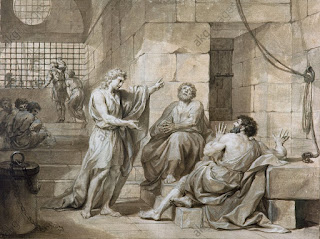The Story - A Brother Betrayed
Joseph's father loved him.
By itself, this wasn't a problem. Joseph loved his father, too, and he was glad for his love. But Joseph's father Israel didn't have just one son—he had twelve, and the other eleven weren't quite as beloved of their dad. And they didn't like that.
It didn't help that Joseph was a dreamer. Several times, he saw visions of astounding profundity: the produce of Joseph's brothers bowing to the produce of Joseph, or the sun and the moon and eleven stars of the heavens bowing down to him. The subtext of these dreams was obvious—someday, Joseph was going to be exalted, and all his siblings would just subject themselves to him along with the rest of the world.
None of this was Joseph's fault, really. The dreams had a divine source, and it wasn't bad that he was able to interpret them. Nor was it Joseph's fault that Jacob his father had loved Rachel his mother more than any of his other three wives, making him, Rachel's firstborn, the favorite son. Joseph didn't go out of his way to make his brothers hate him. But they did anyway.
And soon, that hatred would have near-deadly consequences.
One day, Jacob sent Joseph down to see his brothers, who were out pasturing their flocks a good way away from home. So Joseph went, and after a long time looking, found them.
Unfortunately, they saw him first. And the hatred that had been simmering under the surface for years finally boiled over, prompting them to hatch a plot to finally cast the dreamer down from his throne. They caught Joseph, and would have killed him were it not for the intervention of his oldest brother Reuben, who recommended imprisoning him for the time being instead. The hated Joseph being cast into a pit without any food or water, the brothers sat down to enjoy a nice, leisurely picnic, and revel in what they had done.
But an anger killing doesn't get you anything but a short-lived satisfaction. And so when an Egyptian caravan passed the hill where the brothers were eating, they decided to take advantage of it and grab whatever profit they could. Tearing off a piece of Joseph's robe to prove his death, they struck a deal with the traders. Dipping the cloth in blood, they showed it to their father as evidence, and convinced him of the death of his most beloved son. And the dreamer was gone from their lives forever.
Or so they thought.
Meanwhile, Joseph was forced into the chains of slavery. Sold by the traders to a wealthy soldier named Potiphar, he made the best of his situation and began to work, always trusting in the Lord. Soon, his diligence and responsibility manifested themselves to his master, and in a real Proverbs 22:29 moment, he was promoted. Eventually, he was put in charge of everything in Potiphar's household, except for the meal planning—evidently, Potiphar cared deeply about what he ate for dinner.
But it seemed like trouble wouldn't leave Joseph alone. Though he worked hard and strove to honor the Lord, a new thorn rose up in the form of Potiphar's wife. She tried, vainly, to persuade him to sin against her husband with her, but he refused. Many times, she asked him. And when he continued to refuse, being a God-honoring man, she grew angry and accused him of rape.
Joseph was thrown in prison, despite being innocent. You can imagine his feelings at the time. First slavery, he might have thought, and now, this? What have I done? And we might excuse him, if at this point he decided that it didn't pay to be so fastidious.
But that's not what he did. Instead, he took on this new role as prisoner with gusto, carrying over the diligence and responsibility that he showed in Potiphar's service. Even in jail, the prison-keeper noticed. Joseph was given responsibility over all the prisoners in the prison, and the keeper of the prison was confident in his trustworthiness.
This new freedom gave Joseph the opportunity to talk to the other prisoners. Two that he met proved very influential: both high-ranking servants of Pharaoh himself, the chief cupbearer and chief baker had angered their master, and been imprisoned themselves. Unfortunately for them, they had no idea of what fate was coming to them: but they both had a clue in the form of a vision, if only there was someone there to interpret it.
Oh, now we see, don't we? Joseph, the outcast dreamer, was in the exact right place at the exact right time to meet these two souls in need of an interpreter. And he did. He prophesied to the chief cupbearer that he'd be restored to his former position of glory, and to the chief baker that he would be executed.
Though this may not have set the heart of the chief baker at rest—I know it wouldn't have comforted mine, not with those circumstances—all that Joseph interpreted came to pass. Both were taken out of prison in three days, and the cupbearer was restored, having given Joseph a promise that he'd try to put a good word in for him to Pharaoh.
But the cupbearer forgot, and Joseph remained in prison for two more years. Again, you can imagine his thoughts. The two dreams both came true, he thinks, and they were freed. What about my dreams? Will I see the stars and sun and moon bowing down to me? How can I, in this Egyptian prison?
And Joseph waited, hoping and trusting in the Lord.




I love the cliffhanger! “Evidently, Potiphar cared deeply about what he ate for dinner” -that’s my favorite line hahaha.
ReplyDeleteMy mom pointed that out to me XD Kind of makes you wonder...
Delete